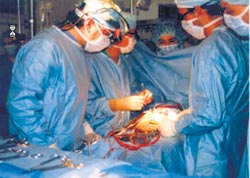
Operation nutritionThe nutritional status of the patient before and after surgery is important for a rapid and successful recovery. Well nourished patients respond to, and recover from illness and surgery better than undernourished patients. Malnutrition is associated with adverse outcomes in surgical patients. Malnutrition can impair wound healing and immunocompetence and decrease cardiac and respiratory muscle function. Malnourished patients undergoing surgery have higher rates of morbidity and mortality as well as longer hospital stays compared with adequately nourished patients. Most patients are not at optimum nutritional status when they are admitted to a hospital. If surgery is to be performed, the patient's nutritional status must be improved by an appropriate dietary regimen prior to surgery. This minimizes surgical risk. Preoperative nutrition Pre-operative nutritional status has a significant impact on surgical outcomes. The major nutritional problems in the preoperative period are under nutrition and over nutrition. Under nutrition and weight loss continue to be prevalent among hospitalized and long term care patients. Because of a lack of the major nutrients necessary for recovery, they are at a higher risk than a patient of normal weight.
Protein deficiency is most common among these patients. Low protein storage will predispose the patient to shock, increased edaema, and decreased antibody production. The last factor increases the risk of infection. By giving appropriate diets with carbohydrates, protein, fat, vitamin, and minerals for malnourished patients, nutrient deficiencies can be corrected. Obese patients are at higher health risk in surgery than those of normal weight. Excess fat complicates surgery, puts a strain on the heart, increases the risk of infection and respiratory problems, and delays healing. Pre-existing conditions such as hypertension and diabetes which are prevalent in obese persons also increase risks. There is no quick way for an obese person to safely lose weight prior to surgery. If time permits, a low calorie diet, high in essential nutrients should be attempted. Starvation or fad diets are not recommended. A reduction diet after surgery is not in the patient's best interest when the need for all nutrients is high. If weight loss is needed, a low calorie diet should not be instituted until healing is complete. Dietary considerations before surgery for an adequately nourished patient are also important. The preoperative diet for these persons should be rich in carbohydrates, protein, minerals, vitamins, and fluids. This will assist in a rapid recovery as it promotes wound healing and decreases the risk of infections and other complications. Physical difficulty with eating, pain, nausea, and diarrhoea will affect a patient's ability to consume an adequate diet. The goal of postoperative diet therapy is to replace body losses as soon as possible. Energy, protein, and ascorbic acid are major factors in achieving rapid wound healing. Major surgical procedures will greatly increase energy and protein requirements. Minerals and other vitamins also play a vital role in recovery. Adequate energy and protein intakes are essential to limit net protein and fat losses. The post operative diet may be liquid, semisolid, soft diet or of regular consistency, but it must be high in calories, protein, vitamins, minerals, and fluids. Immunonutrients such as arginine, glutamine, nucleotides and omega 3 fatty acids reduce complications in surgical patients. Immune enhancing feeds reduce the risk of infectious complications, and reduce hospital stay. Inadequate nutritional supports increase morbidity and mortality, delay the return of normal body functions, and retard the process of tissue rebuilding. Inadequate nutrition prevents wounds from healing at a normal pace and causes edema and muscular weakness. At the stage of post-operative recovery, physicians, dietitians and nurses should work closely to give maximum support to patients. The dietitians should prepare appropriate diets and give dietary advice for surgical patients from pre-surgery to post surgery. A good nutrition plan with intelligent supplementation will help you get back on your feet. (The writer is a Dietitian at the Asiri Surgical Hospital) |
|| Front
Page | News | Editorial | Columns | Sports | Plus | Financial
Times | International | Mirror | TV
Times | Funday
Times | Medi Scene || |
| |
Copyright
2007 Wijeya
Newspapers Ltd.Colombo. Sri Lanka. |
